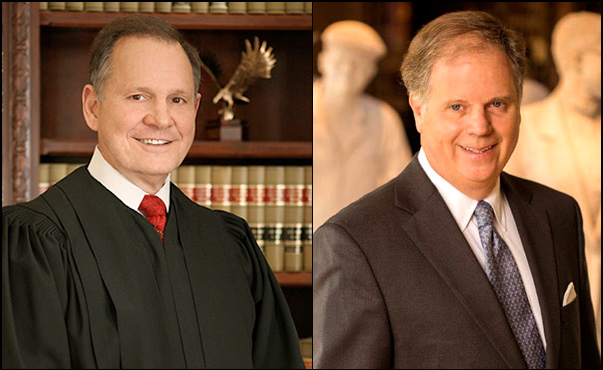By Jim Ellis
Oct. 4, 2017 — The Opinion Savvy research firm went into the field to test the Alabama electorate immediately after last week’s special Republican run-off election, and found the winner of that special primary election, former state Supreme Court Chief Justice Roy Moore, holding only a tenuous lead over his Democrat opponent, ex-US Attorney Doug Jones.
The survey results, which other pollsters will probably soon confirm, should lead to the Democratic leadership launching a major offensive campaign here with the long shot goal of stealing the Republican stronghold seat. They have the resources but are hamstrung in this cycle because few offensive Senate opportunities exist; hence, they must make a serious play for this seat that would not normally be in play.
The Opinion Savvy poll (Sept. 27-28; 590 registered Alabama voters; 514 “definite” Dec. 12 special general election voters; 76 “considering” whether they will vote) finds Judge Moore leading Jones, 50-45 percent. Among the definite voters, Moore’s margin expands slightly to 51-44 percent. Within the lesser-motivated voting group, the Republican’s edge slides to just one point, 46-45 percent.
As we saw during the Republican run-off, a huge split – with diametrically opposite totals – exists between self-described evangelicals and non-evangelicals. Considering that the Census Bureau classifies 49 percent of the entire state population as evangelical, and 55.6 percent of this polling universe, this demographic segment was obviously a crucial block in determining the outcome of the Republican run-off and will have an equally large say in the upcoming special general.
The clear division between evangelical and non-evangelical becomes evident in the cross tabs segmentation within the Opinion Savvy poll. Evangelicals break 68-28 percent in favor of Judge Moore. Non-evangelicals split 70-27 percent for Jones. Obviously, both sides will be attempting to increase turnout, with the Moore forces desiring maximum evangelical turnout while the Jones’ allies will make non-evangelical turnout their top priority.
Two potential skews exist in this poll, and each plays to the benefit of one candidate.
While females constitute 51.5 percent of the Alabama population as a whole, in the Opinion Savvy sampling universe 54.1 percent are women. This is significant because the female vote breaks 48-46 percent in favor of Jones, while men support Moore 55-40 percent. Thus, increasing the female sampling segment by three percentage points over the actual statewide mark potentially provides Jones with a slightly better support status than the electorate might normally yield.
On the other hand, the African-American segment is polling much too favorably for Judge Moore. The OS survey suggests that Moore could be attracting as much as 24 percent of the black vote, a percentage that voting history tells us he will never achieve. Obviously, this part of the poll skews toward Moore and to a greater degree than over-sampling women benefits Jones.
Geographically, the early general election divides similarly with the Republican run-off. As in the Sept. 26 run-off vote, Judge Moore is performing strongly in the Huntsville media market (53-42 percent in the OS poll), Dothan (56-44 percent), and Mobile (54-41 percent). The race is much tighter in Montgomery (49-47 percent), and Birmingham (47-47 percent).
In terms of party, Judge Moore is losing over 17 percent of self-identified Republicans to Jones. The former draws almost 14 percent of Democrats, but it is likely both of these percentages will change as we get closer to the Dec. 12 special general election date. In an era of only single-digit party disloyalty, it is likely that both party’s voters will almost unanimously “come home” before Election Day.
The closeness of the first poll is not particularly surprising. Republicans tend to under-poll in the South based upon their actual vote performance, and there is reason to think this phenomenon will again be present in this Alabama race. But, the numbers and underlying trends are close enough that we can count upon seeing Doug Jones and the Democratic leadership running a competitive race against Judge Moore, even though the latter man still must be rated as a discernible favorite.
The Dec. 12 special election winner serves through 2020, the remaining portion of former Sen. Jeff Sessions’ (R) final elective term.

